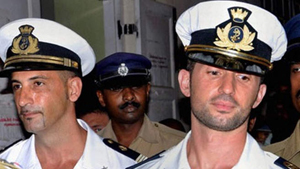 New Delhi, Feb 22: India today said it has asked Italy to provide more security to its embassy in Rome after the mission reported receiving hate mails and a live bullet in retaliation to Italian marines issue.
New Delhi, Feb 22: India today said it has asked Italy to provide more security to its embassy in Rome after the mission reported receiving hate mails and a live bullet in retaliation to Italian marines issue.
Asserting that India takes such incidents very seriously" and it was a "matter of concern", the spokesperson in the External Affairs Ministry said, "We have sensitised our friends in Italy and hope that necessary measures will be taken to ensure safety and security" and noted that government was in touch with Italian government at various levels including "at very senior level".
The spokesperson added, "We had previously undertaken a security review of our embassy in Rome to ensure that security measures are in place. But as you are aware it is the responsibility of the host country to ensure security under Vienna Convention (to foreign missions)."
Italian government has expressed its disappointment over the slow pace of trial of its two marines charged with killing two fishermen in February 2012 and recalled its Ambassador in New Delhi Daniele Mancini for consultations earlier this week while accusing Indian authorities of "unreliable" behaviour. Italian foreign ministry had also summoned Indian envoy Basant Kumar Gupta on the issue.
The spokesperson said Italy has been "receptive" towards India's request and termed as a serious issue the receiving of hate mails and the live bullet.
"We are at diplomatic communication with Government of Italy at various levels including the very senior level. This is an issue we have taken seriously and have highlighted to our Italian friends who have been receptive to our needs. We hope that necessary safety and security will be ensured to our diplomats there," he said.
The spokesperson said certain measures were put in place at the Mission in Rome after a security review by a team of Indian officials.
"We have ensured that safety of our officials is not in anyway undermined. We had previously sent our officials who did a survey and have put in place necessary measures at the embassy there," he said.
Replying to a question, the official said there have been "lot of differences" between India and Italy but refused to comment further as the matter was sub judice.The Italian marines had allegedly shot dead two fishermen off the Kerala coast in February, 2012 and ever since the two countries have been wrangling over their prosecution.
The National Investigation Agency (NIA), which is probing the matter, had sought permission to prosecute the marines under the Suppression of Unlawful Acts against Safety of Maritime Navigation And Fixed Platforms on Continental Shelf Act (SUA), which carries provisions for death penalty.
After strong objections from Italy, the Home Ministry has reviewed the sanction given to NIA and dropped the charges that carry death penalty on conviction.On Monday, the Supreme Court will be told by the government as to what charges will be brought against the marines.






Comments
Add new comment